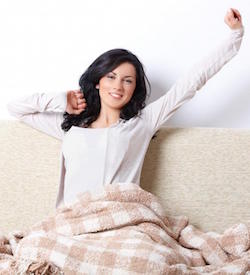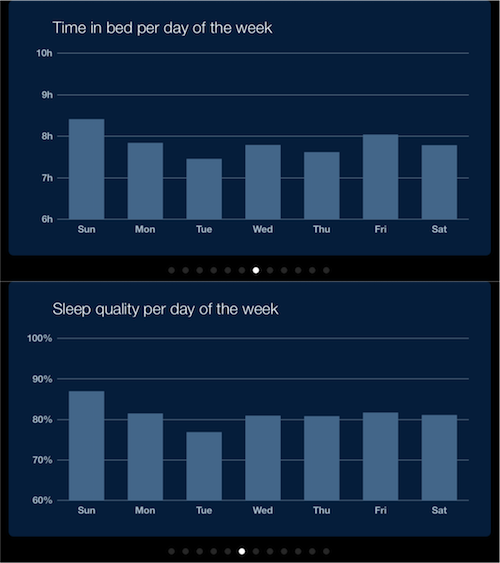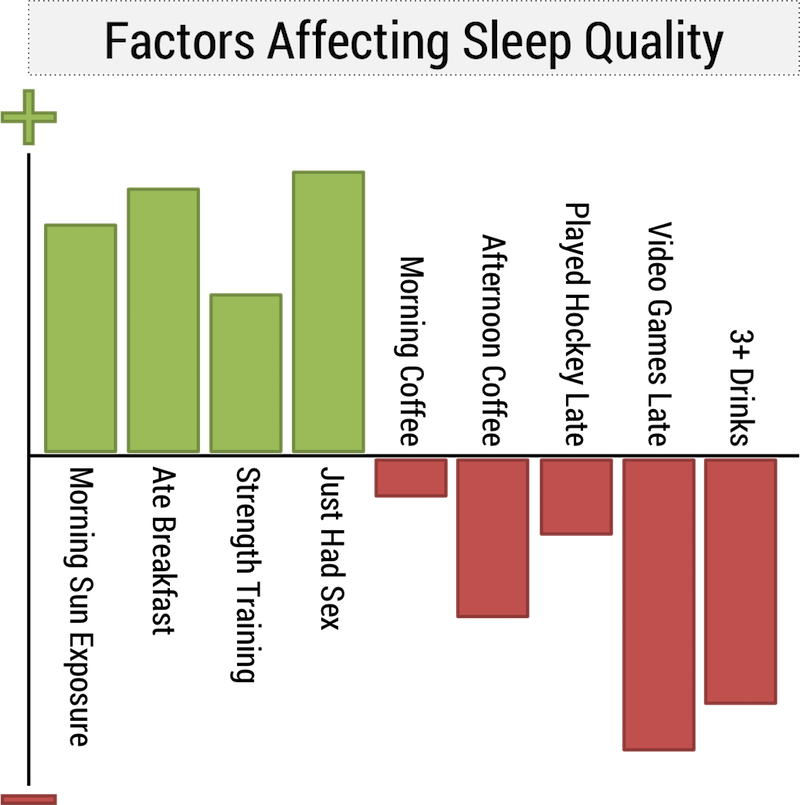 When your sleep is good, most everything just seems to work itself out. Waking up even a little groggy, on the other hand, just makes everything feel a little worse, all day long. So we’re big on improving sleep.
When your sleep is good, most everything just seems to work itself out. Waking up even a little groggy, on the other hand, just makes everything feel a little worse, all day long. So we’re big on improving sleep.
That’s why we’ve written about how light affects your sleep (even just flashes of light), and how to build an invincible circadian rhythm.
And it’s also why we love the SleepCycle App.
SleepCycle tracks your movement as you sleep, making an educated guess about where you are in your sleep cycle, and making an effort to wake you up at the right time. See, waking you up at the right time in your cycle can make you feel a whole lot better, even with less sleep.
Beyond that, the app tracks all sorts of useful data about the quality of your sleep, and how outside factors influence it.
So in addition to recommending that you download the SleepCycle app (it’s not even a dollar), I want to share some insights from my personal data gathering.
Keep in mind, this is all n=1 experimentation, but I think sharing what I’ve learned about myself provides a good launch point for your journey.
More Sleep is Better Sleep
At first glance, this seems pretty obvious. But what surprised me is that sleeping for a longer time improves the QUALITY of my sleep:

The time I spend in bed is pretty tightly correlated with the quality of my sleep.
So sleeping longer has a bit of a compounding effect. Not only do I get the benefit of extra hours in bed, but the hours I spend are more restorative and energizing when I get more pillow time.
In the modern world, we have lots of stuff competing for our time. There are always tv shows to watch and emails to respond to. For me, seeing that powering down earlier benefits my sleep with both quantity and quality is enough motivation to hit the hay a little earlier. And I think you should try it too.
Specific Factors that Break or Better Sleep
My favorite feature of the SleepCycle App is that you can add “Sleep Notes” to determine how different factors influence your sleep. The app will report how each factor affects your sleep quality. I’m a bit of a data nerd, so I’ve got dozens of notes on my app. Here are the few with the biggest influence:

Green bars mean a positive influence on sleep quality, red bars mean negative influence. (click image to view full size)
There’s a fair amount to unpack here, so we’ll go in sections.
Breakfast and Morning Sun
Eating breakfast (mine are always protein-rich) and getting morning sun have been shown to increase melatonin synthesis. More melatonin means better sleep, so the causal connection there is pretty straightforward.
Coffee
Coffee seems to hurt my sleep a bit in the morning, and a fair amount more in the evening. I have coffee just about every morning during the week, and rarely on weekends. So that morning coffee influence is likely an artifact of my propensity to seriously sleep in on Sunday mornings.
Video Games and Booze
Both the video games and the “3+ Drinks” categories get a low sample size warning. I pretty rarely engage in either of these. That said, when I do go out drinking or play video games late, it almost always means I’m sleeping in the next day. Looking through specific nights that match these notes, it seems pretty clear that either of these activities hurt my sleep quality pretty substantially.
And that makes sense. Processing toxic alcohol definitely places a big burden on your body, and drinking heavily has been shown to hurt sleep. The video games effect is likely due mostly to the bright screen exposure, but there could be a competitive stress response factor.
Playing Hockey
Which is most definitely what’s going on with late hockey games. Working out generally improves sleep (you can see that with the strength training), and hockey is definitely a workout. So at first glance, it’s a little puzzling that playing hockey hurts my sleep. But hockey is intensely competitive, so playing it probably triggers a flood of cortisol – the anti-sleep hormone.
Sex Beats Breakfast
Okay, the sex. Having sex right before bed is the single biggest sleep quality promoter I’ve found. It even edges out protein-rich breakfast and morning sun. And sex is also more fun than making eggs and taking a walk.
The men reading will likely identify with improved sleep after sex. And the women reading have likely noticed their male partners nodding off in the afterglow. In fact, it’s so common that the french have a phrase for the phenomenon: “le petit mort” which translates to “the little death”.
And they fully recognize that the effects may be different for men and women. So, your mileage may vary here, but it’s definitely worth experimenting with – sex provides a whole host of health benefits, and it’s generally a good time for all involved.
The Larger Message – Quantify Your Sleep
I’d bet that most of my experience holds true for the majority of people. But thanks to modern technology, you can easily and inexpensively find out what works for you.
Download the SleepCycle App and make use of the “Sleep Notes” feature. You’ll find out what helps and hurts in your specific situation.
And with how important sleep is for your mental and physical health, it is well worth optimizing.
Note: Using SleepCycle requires sleeping with your phone pretty close to your head. I always put mine on “Airplane Mode” overnight to avoid cooking my brain for 1/3 of the day, and I recommend you do the same.
The post Improving Sleep with Smart Data (Or Why Sex Beats Breakfast) appeared first on Quitting Sitting.



















